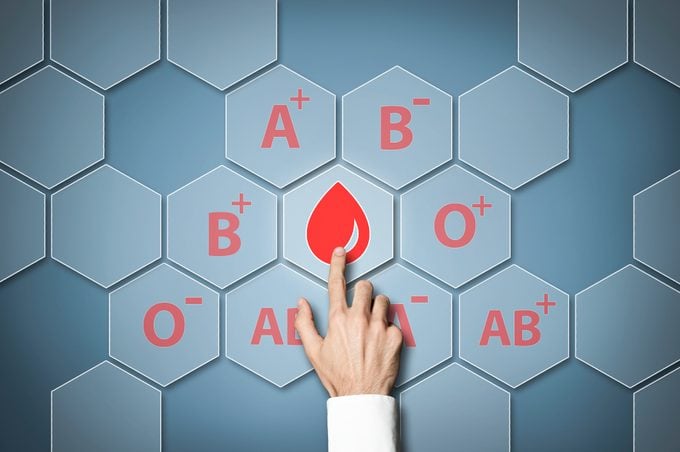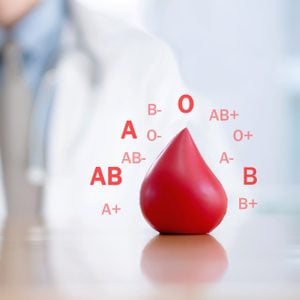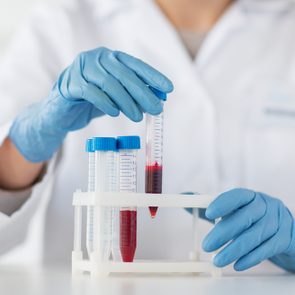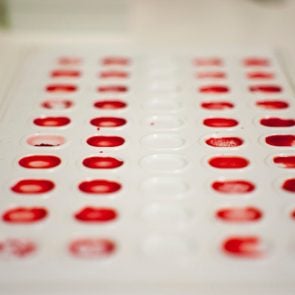What Is the Universal Donor Blood Type?
Updated: Nov. 23, 2020
Doctors typically have to match blood types when they give a transfusion. Find out why O negative is the exception to the rule.

A blood donation can mean the difference between life and death if you need a transfusion, and every year 4.5 million people do, according to the American Red Cross. One type of blood donation can be particularly valuable in an emergency situation.
That’s O negative, also known as the universal donor blood type. “Universal blood donors are important because this type of blood can be used in blood transfusions for any blood type,” says Amanda Ward, DPN, a clinical assistant professor at the Purdue University School of Nursing in West Lafayette, Indiana.
What does your blood type mean?
Experts divide blood types based on whether or not blood cells have A or B antigens on the surface (called the ABO blood group system). Antigens are proteins that can stimulate a potentially harmful immune response.
Blood cells can have the A antigen, the B antigen, both A and B, or neither (O), giving you four ABO types: A, B, AB, and O. These groups are further subdivided by whether or not the cells have an additional antigen, Rh factor, on the surface.
If you have this protein, you are positive and if not, you are negative, explains Mohamad Cherry, MD, medical director of hematology at Atlantic Health System. That adds up to a total of eight main blood types: A+, B+, AB+, O+ or A-, B-, AB- and O-.
Why are blood types important?
In general, blood types don’t have any major impact on your health but they become a life-or-death matter if you need a transfusion. Ideally, doctors would give you the exact same blood type as your own if you needed blood. If you don’t get compatible blood, your immune system can have a severe reaction and attack the red blood cells, explains Dr. Cherry.
“Patients can die,” he says. “It all comes down to immune response,” confirms Tho Pham, MD, chief medical officer at Stanford Blood Center in Palo Alto, California. However, there is a little wiggle room. For instance, anyone who is Rh positive can get blood from someone who is Rh negative, adds Ward.
“Every time a person has a transfusion and every time a person comes to donate, we type their blood to ensure and confirm,” says Yvette Miller, MD, executive medical director of the American Red Cross. “The two most important systems to honor and pay attention to when it comes to transfusions are ABO and the Rh type.”
What is the universal donor blood type?
There is one exception to this compatibility rule: O negative blood. “There are no antigens for the recipient to react to,” explains Dr. Miller. This can be especially useful in an emergency situation. Although hospitals do test patients for blood type, it may take 15 to 20 minutes for the results to come back, says Dr. Pham.
“If you have a hole in your aorta, you can’t wait 15 minutes,” he says. The doctor will grab the O negative not just to get the blood in you quickly but to do it safely.
Is the blood type O negative rare?
Only 6.6 percent of the population has O negative blood type, making it one of the more rare blood types, according to the Stanford Blood Center. (By contrast, 35.7 percent of people have A positive and 37.4 percent have O positive.)
“The minority of people have O negative, about one in 15,” says Dr. Cherry. “Once we identify patients with O negative blood, these are really very precious patients. Usually, blood banks have a list of these donors and often these donors donate on a regular schedule.”
Typically, there’s a high demand for O negative blood and a perpetual shortage, says Ward. “It’s always a tense situation to make sure we have adequate amounts of O negative blood on the shelf because there is such a small segment of the overall population,” confirms Dr. Miller. “We constantly struggle to make sure we have enough O negative units on the shelf.”
Blood types and Covid-19
A preliminary March study published in medRxiv suggests that people with blood group A may be more likely to contract SARS-Cov-2, the virus that causes Covid-19. The researchers found blood group O is associated with a lower risk. Another non-peer-reviewed study, released in July in medRxiv, found that people with Rh-negative blood were more likely to get severely ill from Covid-19 and even die.
But a paper published in July in Annals of Hematology contradicted those theories. The researchers found no association between blood type and Covid-19 on either count among 1,289 Covid-positive patients.
“There has not been scientific confirmation that that’s true,” says Dr. Miller. “There’s no scientific evidence on recovering or acquiring Covid-19 infection.” (Learn more about how convalescent plasma is used to treat Covid-19.)
How to donate blood
During the initial Covid-19 lockdowns, blood donations dipped. Supplies are back up but there’s always a need for blood, especially O negative blood, says Dr. Miller. The donation process is safe even during a pandemic, she adds. Donors now require an appointment. There are no walk-ins, she says.
Once you come into the blood collection site, staff will take your temperature (twice) and ask questions about any recent Covid-19 exposure. Everyone is required to wear a mask, staff deep clean between each donor, and, of course, social distancing is enforced.
Know your blood type
Donating blood is one way to learn your blood type. However, you can find out your blood type at home, at the doctor’s office, and in a number of different ways.
In an emergency, hospitals will check your blood type but it’s always a good idea to know beforehand. “Many people don’t know and I recommend all people to at least check,” says Dr. Cherry. “It’s a simple blood test.”



